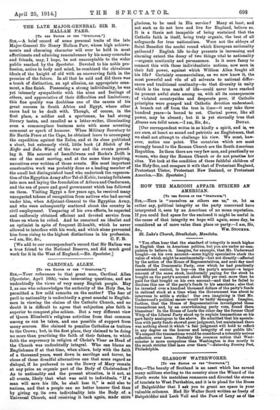THE LATE MAJOR-GENERAL SIR H. HALLAM PARR.
[To Tax Eorros or TH. "SracrAt0e.1 Sin,—A brief record of BOMB personal traits of the late Major-General Sir Henry Hallam Parr, whose high achieve- ments and charming character will ever be held in most affectionate and admiring remembrance by his many comrades and friends, may, I hope, be not unacceptable to the wider public reached by the Spectator. Devoted to his noble pro- fession, active in body and mind, he combined the chivalrous ideals of the knight of old with an unswerving faith in the promise of the future. In all that he said and did there was a touch of distinction, an apt allusion, an appropriate orna- ment, a fine finish. Possessing a strong individuality, be was yet intensely sympathetic with the aims and feelings of others, and appreciative of their difficulties and limitations; this fine quality was doubtless one of the causes of his great success in South Africa and Egypt, where other races had to be dealt with. Though, of course, in the first place, a soldier and a sportsman, he had strong literary tastes, and excelled as a letter-writer, illuminating even a commonplace business note with some arresting comment or spark of humour. When Military Secretary to Sir Bartle Frere at the Cape, he obtained leave to accompany the expedition against the Zulus, and at its close published a short, but extremely vivid, little book (A Sketch of the Kaffir and Zulu Wars) of the war and the events preced- ing it. His account of Isandhlwana and Rorke's Drift is one of the moat moving, and at the same time inspiring, narratives ever written of those events. His most important constructive work was probably done as a leading member of the small but distinguished band who undertook the regenera- tion of the Egyptian Army after Tel-el-Kebir, turning fellaheen into men and laying the foundation of Atbam and Omdurman, and the era of peace and good government which has followed on them. Visiting Egypt a few years ago, he received many unexpected tokens of recognition from natives who had served under him, when Adjutant-General to the Egyptian Army, and who were subsequently scattered about the country in civil employment. Unsparing of his own efforts, he expected and uniformly obtained efficient and devoted service from those on whom he relied. And he remained an idealist and an optimist in spite of frequent ill-health, which he never allowed to interfere with his work, and which alone prevented Lim from rising to the highest distinctions in his profession.
—I am, Sir, &c., C. F. B. [We add to our correspondent's record that Sir Hallam was a true friend to the National Reserve, and did much good work for it in the West of England.—En. Spectator.]


























































 Previous page
Previous page